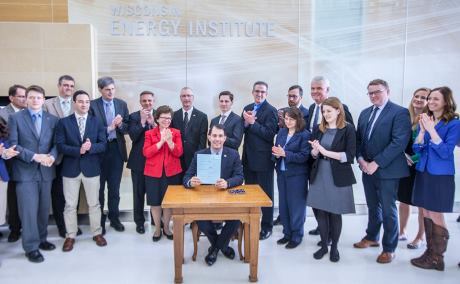 |
| Jon Breed |
On April 1st, 2016, Governor Scott Walker signed a bipartisan bill ending Wisconsin’s 33-year moratorium against building new nuclear energy facilities. After signing the bill, Walker said that “nuclear energy sustains Wisconsin’s economy two ways, both in employing a skilled, well-paid workforce to run a nuclear plant, and in providing the affordable, reliable source of emission-neutral power on which all businesses and employers rely.”
The passage of the bill is a testament to the power of coalitions and grassroots advocacy and will serve as a model for how pro-nuclear advocates drive policy outcomes in the future.
A lot has changed in American politics in the past fifteen years. The age of shoe-leather lobbying has been supplemented by a new kind political influence: the power of coalition advocacy. This shift began with the rise of the internet and was refined by groups like Organizing for America and Heritage Action.
Understanding this change in political winds, NEI saw an opportunity to activate nuclear energy advocates when Wisconsin State Representative Kevin Petersen introduced a bill to repeal his state’s nuclear energy ban last October. This set off a chain of events that ultimately led to the bill’s passage.
Before getting involved, however, we asked ourselves three very basic questions:
- Does it advance NEI’s policy priorities?
- Is there a path to success?
- Who are our allies on the ground and how do we get them engaged?
The first question was easy. The initial ban on new nuclear energy was put into place in the 1980s and NEI has worked for years to repeal the moratorium.
Next we looked for a path to success. Our initial analysis revealed a state political system that was deeply divided. Despite the fact Wisconsin has a Republican Governor and Republican-controlled legislature, the volatile political landscape has created bitter partisan divide.
However, the industry views nuclear energy as a bipartisan issue capable of bringing people together. As a result, we set out to build a coalition of Wisconsin advocates dedicated to communicating nuclear energy’s value proposition.
In October, NEI’s State Outreach and Advocacy Team came together to formulate a deliberate and comprehensive plan that would best leverage the power of grassroots advocacy. After taking an inventory of potential allies, we executed a broad outreach initiative that included local politicians, policymakers, unions, business coalitions, student groups, academics, small businesses, environmentalists and electric industry experts. What resulted was a sizable coalition that effectively engaged both sides of the aisle.
Despite this precarious political landscape, the strategy worked. After countless phone calls, emails, letters, social media engagements and office visits, we saw an issue, that has historically failed, gain real traction.
So much traction, in fact, that the Wisconsin Assembly passed the bill unanimously and the Wisconsin Senate passed it with a large bipartisan majority: 23-9. Shortly thereafter, Governor Walker signed the bill into law before a large audience of nuclear advocates at the University of Wisconsin.
 |
| Signed, sealed and delivered. |
Comments